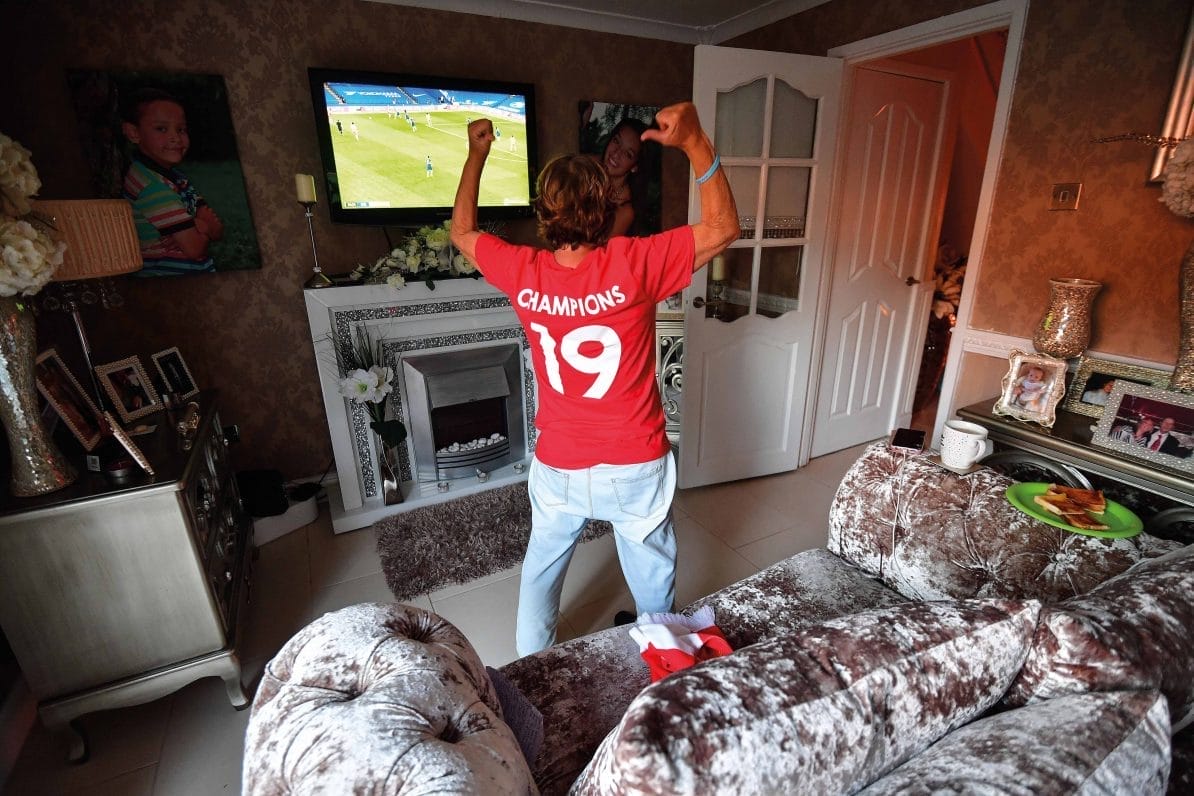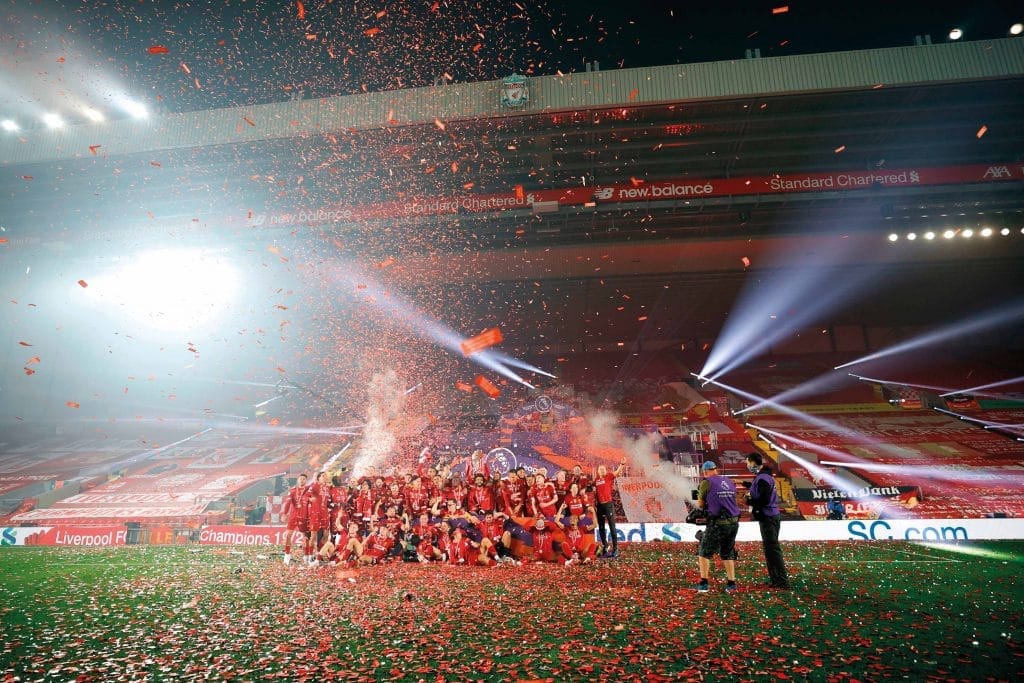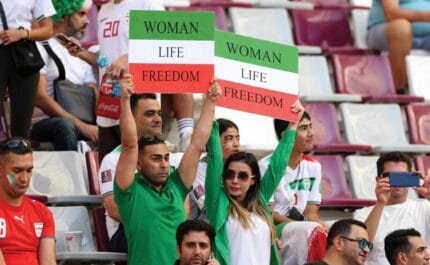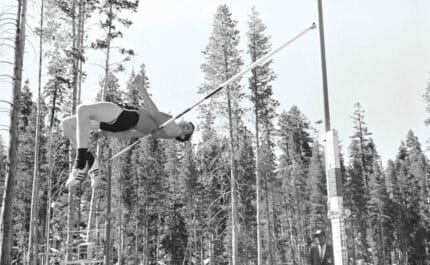Moment that mattered: Liverpool win the Premier League
In autumn 2020 we spoke to journalist and author Simon Hughes about Liverpool's long-awaited title win

A Liverpool fan watches the Premier League match between Chelsea and Manchester City. Photo: Anthony Devlin / Offside / Getty Images
25th June 2020 (Taken from: #39)
During the 30-year drought, Simon Hughes had allowed himself to dream about what it would feel like when the moment finally came. “I probably thought about it every day of my life: What would it be like when Liverpool won the league again?” says Hughes, author of several books about football, politics and culture in Liverpool, the city where he grew up. “You sort of envisage how the city will react and the parties that would happen.”
On 25th June Chelsea beat the reigning champions Manchester City 2-1. City’s defeat confirmed what almost everyone in football had known since the turn of the year. That Liverpool FC, who had been streets ahead of their nearest rivals during the 2019/20 season, were the new Premier League champions. It was Liverpool’s first Premier League title, and the first time they had won the English league in three decades. But football didn’t begin in 1992, when the old First Division was replaced by the Premier League. Between 1960 and 1990, just after Bill Shankly was hired as manager in 1959, Liverpool won 13 titles as well as four European Cups. They were feared around the world.
Yet as the 1990s began, Liverpool FC retreated from the top of the English game. The roots of that decline are outlined in Hughes’s most recent book about the city in the 1980s, There She Goes: Liverpool, a City on Its Own. It’s a story that covers Thatcherism, de-industrialisation, the Hillsborough disaster and other seismic events which shaped the city and its two major football clubs – Liverpool and Everton – over the decades that followed.
Liverpool’s greatest period of success was in the decade where the city was at its lowest point”
The city, or at least the red half of it, waited in vain for the glory years to return as Manchester United instead rose to become the giants of the Premier League era. For fans like Hughes, every near miss seemed to push the prospect of a Premier League title further and further away. Liverpool came second in the 2001/02, 2008/09 and 2013/14 seasons. Then there was 2018/19, when current coach Jürgen Klopp masterminded a season with just one solitary defeat, but still managed to come second to Manchester City. The 2019/20 title, though, finally seemed inevitable. By March Liverpool were 22 points clear of Manchester City in second place. But then the Covid-19 pandemic swept the world and the league was suspended. At one point it wasn’t even clear if the season would even be allowed to finish.
When it resumed three months later, the matches took place in stadiums without fans. It was, for Hughes, a touch anti-climactic. “It was weird for me because the day we won it, I was at home alone,” he recalls. A few hundred fans congregated outside Anfield and lit flares, but it was a tiny reaction compared to what would be expected in normal times. When Liverpool won the Champions League in 2019, three quarters of a million people took to the streets. “That was like India winning the Cricket World Cup, it was just insane,” says Hughes. “This didn’t feel celebratory at all.”
To understand the significance of Liverpool winning the Premier League it’s worth looking back to 28th April 1990 when Liverpool came from behind against QPR to win their 18th title. It was an emotional moment. The match took place almost exactly a year after the Hillsborough tragedy, when 96 Liverpool fans died during an FA Cup semi-final against Nottingham Forest. In the aftermath, senior police officials blamed fans for the deaths. In this they were supported by The Sun newspaper editor Kelvin McKenzie whose infamous “The Truth” front-page splash remains one of the darkest and lowest points in British journalism. The coverage, Hughes says, wasn’t just about deflecting blame. It also, he believes, fed into a deep well of prejudice against a city that had been hit hard by Thatcher’s economic policies. Years later a cabinet memo written by Thatcher’s chancellor Sir Geoffrey Howe after the 1981 Toxteth riots was released under the 30-year rule. It suggested that Liverpool was beyond help and that the government’s role was now to facilitate a “managed decline”. Two of the few things that weren’t in “managed decline” during the 1980s, however, were Liverpool and Everton who between them won eight out of ten league championships. “Liverpool’s greatest period of success,” says Hughes, “was in the decade where the city was at its lowest point.”
It took years for the truth to come out about Hillsborough, that the police were to blame, as well as the decrepit stadium. The disaster changed the course of football. In January 1990, the Taylor Report recommended the introduction of all-seater stadia, paving the way for a new, breakaway, broadcaster-led Premier League. Although Liverpool won the league the following season, Hillsborough would have a lasting effect on the players and especially the manager, Kenny Dalglish. “There is no doubt in my mind that [the] Hillsborough [disaster] did have an effect on the trajectory of the club,” says Hughes. “Dalglish hasn’t really spoken about it, but people have spoken on his behalf about how his connection with the players became tighter after Hillsborough. It meant that he wasn’t really able to let go of some of them.” Irish international striker John Aldridge was one of the few to be sold and has since spoken of how he felt betrayed by Dalglish. Hughes argues that Dalglish’s reluctance to move on players who had shared such a traumatic experience and bring in new talent is one of the reasons for the team’s decline. “That Liverpool team got older at just the wrong time,” says Hughes. “A few years later the Premier League starts, new money is coming into the game, players are getting paid more. The club didn’t really know how to deal with that shift and dynamic.”

Liverpool’s captain Jordan Henderson lifts the Premier League trophy inside Anfield stadium, 22nd July 2020. Photo: Phil Noble / Pool / AFP via Getty Images
The first Premier League was won by Manchester United, their first league title in 26 years. The two clubs’ trajectories switched. Under manager Sir Alex Ferguson – a man known for his knack of judging when to sell on his star players – Manchester United won 13 titles over the next 21 seasons. For Liverpool there was Champions League success in 2005 and 2019, a UEFA Cup, two FA Cups and four league cups. The club was saved from an ownership spat that had the potential to bankrupt it, and saw an injection of funds when it was bought by the American Fenway Sports Group in 2010.
Today the club has a legitimate claim to being one of the most followed teams in the world. A recent study by the club found that Liverpool could have as many as 700 million active supporters. But despite the club’s continued popularity abroad and its success in Europe, the absence of a Premier League title left a hole that needed to be filled.
On 22nd July, club captain Jordan Henderson lifted the trophy in front of an Anfield with no fans in attendance. Liverpool had just beaten Chelsea 5-3 in a match fit to crown any champions. Hughes wasn’t there, of course, but because of the easing of Covid-19 restrictions, he could at least watch the game with his friends in the pub. It came close to capturing what he thought he would feel, even if there was the lingering suspicion that Liverpool would have to do it all over again when fans are allowed to go back into the stadiums in order to really bring home what had been achieved. “That feeling of Anfield just exploding and then going mad, where the final whistle is blown and you’re the champions, it still hasn’t been felt,” he says. “And until that happens, for somebody like me anyway, I will still be looking out for that moment.”
There She Goes: Liverpool, a City on Its Own. The Long Decade: 1979-1993 by Simon Hughes (deCoubertin) is out now in paperback.
Slow Journalism in your inbox, plus infographics, offers and more: sign up for the free DG newsletter. Sign me up
Thanks for signing up.








